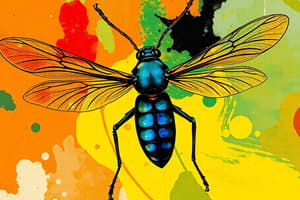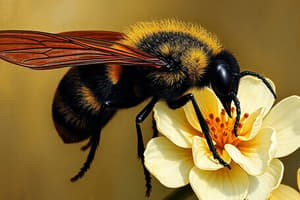Podcast
Questions and Answers
What is a significant advantage of biological control over chemical control methods?
What is a significant advantage of biological control over chemical control methods?
- Higher flexibility in pesticide usage
- Shorter restricted entry intervals
- Reduced risk of resistance development (correct)
- Increased effectiveness in killing pests
Which type of pesticides disrupts the nervous system of targeted insects?
Which type of pesticides disrupts the nervous system of targeted insects?
- Juvenile hormone analogs
- Traditional pesticides (correct)
- Growth regulators
- Insect-specific toxins
What is the primary goal of Integrated Pest Management (IPM)?
What is the primary goal of Integrated Pest Management (IPM)?
- To effectively manage pests while minimizing environmental impact (correct)
- To maximize pesticide usage
- To eliminate all pest populations
- To solely rely on biological control methods
Why have alternative chemistries like growth regulators and insect-specific toxins been developed?
Why have alternative chemistries like growth regulators and insect-specific toxins been developed?
In which way can biological control be integrated with chemical control methods?
In which way can biological control be integrated with chemical control methods?
What poses challenges to the adoption of biological control in agriculture according to the text?
What poses challenges to the adoption of biological control in agriculture according to the text?
Why is proper identification of insect pests crucial in agricultural practices?
Why is proper identification of insect pests crucial in agricultural practices?
Which type of living organisms are used in biological control methods to suppress pest populations?
Which type of living organisms are used in biological control methods to suppress pest populations?
What is the primary difference between predators and parasitoids in biological control methods?
What is the primary difference between predators and parasitoids in biological control methods?
Which technique is NOT commonly used for the identification of insect pests?
Which technique is NOT commonly used for the identification of insect pests?
What is the main objective of classical biological control in pest management?
What is the main objective of classical biological control in pest management?
Why are chemical control methods sometimes less preferred compared to biological control methods?
Why are chemical control methods sometimes less preferred compared to biological control methods?
Flashcards are hidden until you start studying
Study Notes
Agricultural Entomology: Identification, Biological Control, and Chemical Control
Agricultural entomology is the branch of science dealing with the study of insects in relation to agricultural practices. It encompasses various aspects, including insect pest identification, biological control methods, and chemical control methods.
Identification of Insect Pests
Proper identification of insect pests is crucial for effective management strategies. Identifying the specific species causing damage to crops or livestock is essential to determine appropriate control measures. Various techniques such as morphological identification, molecular analysis, and genetic profiling are employed to accurately classify insect pests.
Biological Control Methods
Biological control involves the use of living organisms to suppress pest populations without using chemical pesticides. Natural enemies of insect pests include predators, parasitoids, and pathogens. Predators feed directly on pests, while parasitoids lay their eggs inside the bodies of hosts, which hatch upon emergence, killing the host. Pathogens are microorganisms that cause diseases in insects. These biological agents are introduced into the environment to reduce the population size of the target pest. Classical biological control involves introducing foreign species to control invasive pests, while modern programs focus on introducing native species to minimize potential ecological risks.
Benefits of Biological Control
Benefits of biological control include reduced reliance on chemicals, decreased risk of resistance development, flexibility in usage of personal protective equipment, shorter restricted entry intervals, and reputational advantages of being a sustainable grower. Additionally, biological control can be employed to manage pest populations resistant to conventional pesticides.
Chemical Control Methods
Chemical control involves the use of pesticides to kill or deter pests. Traditional pesticides act as neurotoxicants, disrupting the nervous system of targeted insects. However, the increasing prevalence of pesticide-resistant pests necessitated the development of alternative chemistries, such as juvenile hormone analogs, growth regulators, and insect-specific toxins.
Integration of Chemical Control with Biological Control
Biological control can be integrated with chemical control methods to achieve a more holistic approach called Integrated Pest Management (IPM). IPM combines various pest control tactics, including cultural, biological, and chemical methods, to effectively manage pests while minimizing environmental impact.
While biological control remains a promising option for sustainable agriculture, challenges persist due to technical, economic, and attitudinal barriers. Nevertheless, with continued research and adoption of IPM practices, the future of biological control is expected to play a significant role in crop protection, contributing to food security and environmental sustainability.
Studying That Suits You
Use AI to generate personalized quizzes and flashcards to suit your learning preferences.




